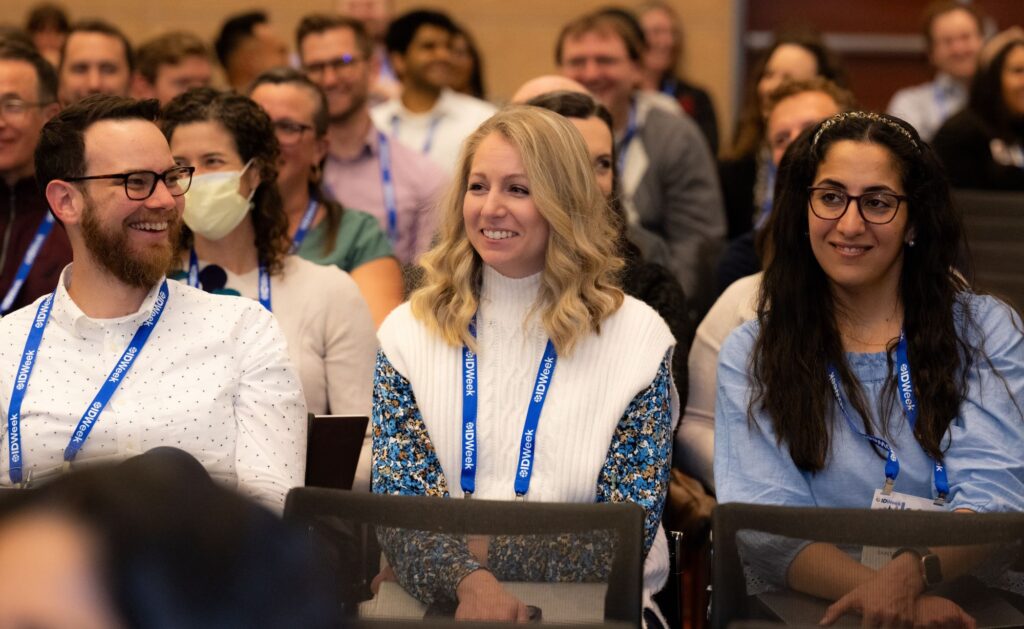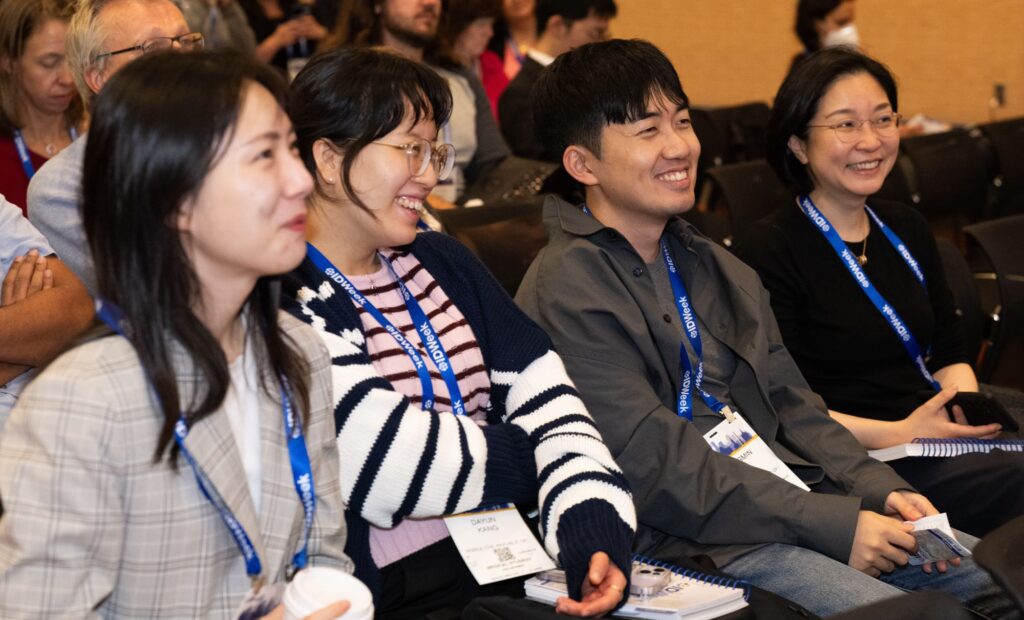
2024 Interactive Program
Continue the fun and start planning for IDWeek by browsing the Interactive Program. Explore exciting events, learn about speakers you don’t want to miss, and more!

Continue the fun and start planning for IDWeek by browsing the Interactive Program. Explore exciting events, learn about speakers you don’t want to miss, and more!
The IDWeek Program-at-a-Glance is available! Find the session titles, affiliated event times, exhibit hall hours and more. Review the Program-at-a-Glance and prepare to register for IDWeek 2024.

Interactive sessions are 75 or 105 minutes with four panelists. Interactive sessions generally consist of case presentations by the moderator(s), which are then discussed by the panelists. Moderators include case-based scenarios to allow for use with the audience response system allowing attendees to vote on diagnoses. The moderator will provide the answer to the case and the moderator and panelists will engage in a brief discussion of important points.
Meet-the-professor sessions are one hour and are clinically oriented sessions that focus on interaction between one or two faculty members and the audience.
IDWeek will have an opening plenary session in the afternoon on Wednesday. The plenary session will feature leading experts in a variety of fields within the infectious diseases specialty. Experts will share lessons learned based on experience and stories in their respective fields.
Symposia sessions are either 75 or 105 minutes with usually three or four speakers depending on the length of the session. Each speaker will give a PowerPoint presentation consisting of 15 to 20 minutes of lecture, depending on the time slot and number of speakers, and 5 to 10 minutes of Q&A.
Industry-sponsored affiliated events include up to 2-hour satellite symposia, 1-hour presentation theaters and 45-minute learning lounges.
Named lectures honor members who have demonstrated significant contributions in the field of infectious diseases. Listed below is a brief description of the named lectures.
Dr. Enders was the second president of IDSA and received a Nobel Laureate in Medicine in 1954 for the discovery of the ability of poliomyelitis viruses to grown in cultures of various types of tissue. This discovery led to the development of vaccines against polio, measles, rubella and mumps as well as other advances. His contributions also include major advances in the field of genetics, links between viruses and cancer, and insights into the pattern and process of tumor growth. The Enders lecture is intended to honor someone who has significant contributions in the field of medical virology.
Dr. Finland served as the first president of IDSA and had a career that spanned over 50 years at Harvard University and Boston City Hospital. He was internationally recognized for his study of ID and antimicrobial agents in treatment. He is credited with influencing pioneering studies of antibiotic therapy and the treatment for pneumonia and respiratory injuries linked to exposure to noxious gases. He was also noted as establishing early identification of new infectious hazards and the emergence of dangerous new infections in hospitalized patients. The Finland lecturer is generally someone who has contributed in the areas of bacterial pathogenesis, antimicrobial agents, emerging infections, and hospital-acquired infections.
The lectureship is dedicated to and honors Dr. Caroline B. Hall, a world0-renowned pediatrician, teacher, researcher and founding member of PIDS. Dr. Hall held the position of professor of pediatrics and medicine at the University of Rochester School of Medicine for over 40 years. She was a legend in pediatric infectious diseases for her groundbreaking and prolific research on respiratory syncytial virus, human herpesvirus 6, and other respiratory viral pathogens and authored over 500 peer-reviewed publications. Her contributions significantly enhanced our understanding of diverse respiratory viral infections and resulted in the development of diagnostic and management guidelines for infections that continue to be important clinical references. Dr. Hall served as the fifth president of PIDS and was the Society’s historian. She was a member of the Institute of Medicine and the Royal College of Physicians and received numerous honors, including the Distinguished Physician and Distinguished Service awards from PIDS, the IDSA John F. Enders Lectureship, the Pan American Society for Virology Award, and the Robert M. Chanock Lifetime Achievement Award. The emphasis of the lectureship is to highlight innovative translational research focused on common infectious diseases, with special emphasis on clinical research and novel approaches to the epidemiology, diagnosis, management, prevention and treatment of these infections.
Dr. Kass was one of the founding leaders of IDSA and served as the Society’s seventh president in 1970 as well as the Society’s secretary from 1964 to 1967. He was instrumental in securing IDSA’s role in publishing The Journal of Infectious Diseases, and he developed the concept for Reviews of Infectious Diseases — now Clinical Infectious Diseases. Not only was he a pioneer in the study of infection, he was also an advocate for social justice and passionate about addressing poverty, racism and discrimination. The Kass lecture was initially established as a “history of medicine” lecture and has traditionally been given by a recognized educator, thought leader and someone with a broad understanding of societal influences in medicine.
The Stanley A. Plotkin Lecture in Vaccinology is presented annually to an individual who has made significant contributions to the field of vaccinology or areas of related science that have impacted the lives of children and the specific area of pediatric infectious diseases.
The SHEA Lectureship award is given annually to recognize the career contributions of a senior investigator in healthcare epidemiology and infection prevention and control. The selected speaker is chosen based on his or her notable contributions to the science of healthcare epidemiology, demonstration of ongoing dedication to advancing the field of epidemiology, demonstration of mentorship, and dedication to SHEA and its mission to prevent healthcare-associated infections and advance the science of healthcare epidemiology.
Dr. Smadel was a physician and investigator who created a bridge between basic laboratory science and the clinician, making significant contributions to the knowledge of psittacosis, vaccinia, variola, myxomatosis and viral encephalitis. During World War II, Dr. Smadel led a study of control measures of typhus fever in Egypt and southern Italy. Dr. Smadel served at the Department of Virus and Rickettsial Diseases of the Army Medical School, Walter Reed Army Institute of Research and the National Institutes of Health. He held the position of chief of virology and rickettsiology in the Division of Biologic Standards at NIH until his death. The Smadel lecture is intended to honor someone who has made a significant impact in public health.